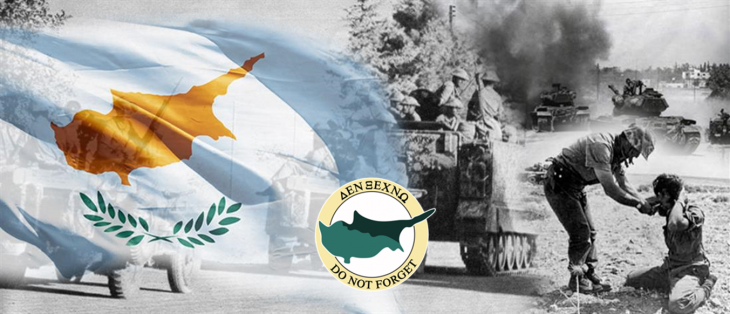
TODAY Cypriots from the London community will mark the tragic day with a pro-reunification rally at 43 Belgrave Square at 6.30pm in the evening. This event is organised by the National Federation of Cypriots in the UK who represent a number of associations within the wider Cypriot community in this country.
Nepomak UK a group connecting young Cypriots on a talk show on LGR this week told listeners, “There’s a sense of community and Cypriot unity within Cypriot Greeks, Turkish, Armenian ethnicities in London.” This sense of reality is the thing to “inspire Cypriots” to resolve the long-protracted Cyprus problem the team added.
The “Cypriot youth” could well serve as the catalyst that eventually arrives at a “solution” said Constantine Alexandrou, honorary Vice-President at Nepomak UK. The Republic of Cyprus points to existing U.N. resolutions that the island reunifies under a federal umbrella with a central government in Nicosia.
On July 20, 1974 at 5:30am, Turkish troops landed on the Republic of Cyprus’ coast five miles off Kyrenia. Since that day, nothing on the island has ever been the same.
Every year since, on the anniversary of the invasion, sirens have blared out over the Republic, recalling the moment Turkish troops invaded.
In 1974, approximately 40,000 Turkish troops under the command of Lieutenant Nurettin Ersin implemented their invasion plan, code-named ‘Attila’, illegally invading the island in violation of the UN Security Council Charter.
Turkey still illegally occupies 37 per cent of Cyprus’ territory.
Turkish troops invaded Cyprus on July 20, 1974, five days after the legal government of the late Archbishop Makarios III was toppled by a military coup, engineered by the military junta then ruling Greece. Two unproductive conferences in Geneva followed; the first between Britain, Greece and Turkey and the second with the additional attendance of Greek Cypriot and Turkish Cypriot representatives. Three weeks after the ceasefire of July 22, and despite the fact that talks were still being held and just as an agreement seemed about to be reached, the Turkish army mounted a second full-scale offensive. As a result, Turkey increased its hold to include the booming tourist resort of Famagusta in the east and the rich citrus-growing area of Morphou in the west.
All in all, almost 37% of the territory of the Republic of Cyprus came under Turkish military occupation. Nearly one-third of the population, some 200,000 Greek Cypriots, were forcibly uprooted from their homes and properties, thousands were killed during the hostilities, over 1,000 persons were listed as missing while thousands of Greek Cypriots and Maronites remained enclaved.
Numerous UN resolutions have demanded respect to the independence, unity and territorial integrity of Cyprus, the return of the displaced to their homes, and the withdrawal of foreign troops from the island, but all resolutions have been ignored by Turkey.
For five decades, Cyprus has been one of the most troublesome problems faced by the United Nations. There have been countless attempts to reunite this island. However, efforts have been at a dead end since the last round of United Nations sponsored talks failed in 2017.
Attempting to break the impasse, an envoy for U.N. Secretary General Antonio Guterres began exploring contacts on Cyprus earlier this year.
Maria Angela Holguin’s mandate to explore the recommencement of negotiations, saw her embark on intensive shuttle tours of Cyprus, Europe and the region to gauge opinion. Nevertheless, her efforts failed to gain momentum.
‘It’s important to steer away from solutions that have created unfulfilled expectations in the past and actually led to more disagreement and disappointments’, Holguin said in an open letter last week. She urged people to think differently, saying a common future would bring about great opportunities for all Cypriots.
In a long and often emotional letter, she urged Cypriots to ‘overcome the history of pain’.
The Cyprus problem is complicated and covers a range of critical issues including security, property, refugees, settlers, the economy and the constitution.
50 years on from the most tragic page in the Republic of Cyprus’ history, at 5:30am the war sirens rang around the island once more.